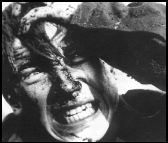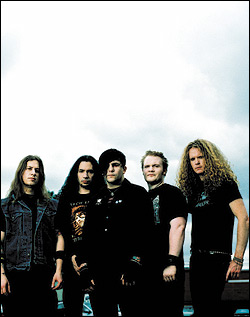COME AND SEE
directed by Elem Klimov with Aleksei Kravchenko runs May 10-16 at Grand Illusion
WHEN A FILM leads an innocent young hero into an unrelenting physical and psychological nightmare, then completely abandons him, our natural instinct as an audience is to retreat. If his ensuing punishment isn’t ultimately vindicated somehow, we suffer along with him, often forgetting—or simply ignoring— the ordeal’s greater meaning.
In this little-known landmark 1985 World War II movie, director/ co-writer Elem Klimov puts idealistic Florya (Aleksei Kravchenko) through such unyielding hell that the boy’s hair turns from dirty blond to shocked white. We’ve all cringed and wept at Nazi atrocities on film (e.g., Schindler’s List and Sunshine), but Klimov augments the carnage inflicted upon Belorussian partisans and villagers through a masterfully unfettered wide lens. His frigid sweep instills agoraphobia in the audience; when a Steadicam pans through a burning village to reveal possible escape routes for Florya, we’re too mortified to hope that he tries.
Come and See begins with a modesty that befits its prewar countryside setting, circa 1943. Twelve-year-old Florya and a friend engage in mock skirmishes while rummaging through a battlefield for a working rifle, mandatory for joining the Belorussian resistance. Eager to combat fascism, Florya soon leaves his twin sisters and hysterical mother behind. He jaunts through the resistance camp like Robin Hood, greeting every tired veteran with a shit-eating grin and exuberant “Hello!”
Unfortunately, Florya’s as green as a shamrock. After botching a guard duty stint, he’s left behind in humiliation while the troops head off to battle. This turn of events is critical; Florya breaks down in tears, only to find his commander’s buxom young girlfriend sobbing nearby. They laugh at each other’s melodrama. They empathize. They bond.
A lesser movie would lose focus here, shaping this chance encounter into love triangle fluff, ࠬa Pearl Harbor or Enemy at the Gates. Klimov instead amplifies the real into the surreal, experimenting with sound and all but eliminating dialogue as an ensuing Nazi ambush damages Florya’s hearing. We assume the boy will harden into a stoic fighter as he incurs personal tragedy and struggles with soldier-civilian politics. Instead, he’s sucked into an unbearable downward spiral in which an entire village experiences all the brutality and hate the invading Nazis can muster.
Florya’s fate and physical well-being are largely incidental to Klimov, whose ultimately conventional question to both protagonist and viewer is not just “Can you leave these awful sights and sounds behind?” but “Should you?”







